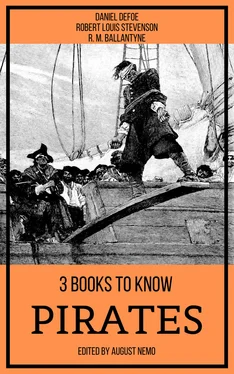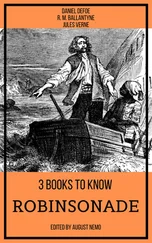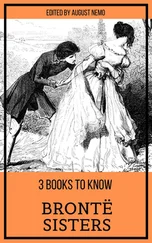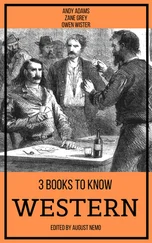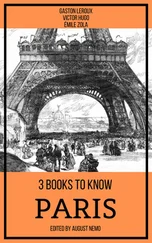“No, not half-a-mile.”
“Then lead me to it,” said Jack, seizing his axe.
In a few minutes we were all three pushing through the underwood of the forest, headed by Peterkin.
We soon came to the tree in question, which, after Jack had closely examined it, we concluded must be the candle-nut tree. Its leaves were of a beautiful silvery white, and formed a fine contrast to the dark-green foliage of the surrounding trees. We immediately filled our pockets with the nuts, after which Jack said:
“Now, Peterkin, climb that cocoa-nut tree and cut me one of the long branches.”
This was soon done; but it cost some trouble, for the stem was very high, and as Peterkin usually pulled nuts from the younger trees, he was not much accustomed to climbing the high ones. The leaf or branch was a very large one, and we were surprised at its size and strength. Viewed from a little distance, the cocoa-nut tree seems to be a tall, straight stem, without a single branch except at the top, where there is a tuft of feathery-looking leaves that seem to wave like soft plumes in the wind. But when we saw one of these leaves or branches at our feet, we found it to be a strong stalk, about fifteen feet long, with a number of narrow, pointed leaflets ranged alternately on each side. But what seemed to us the most wonderful thing about it was a curious substance resembling cloth, which was wrapped round the thick end of the stalk where it had been cut from the tree. Peterkin told us that he had the greatest difficulty in separating the branch from the stem on account of this substance, as it was wrapped quite round the tree, and, he observed, round all the other branches, thus forming a strong support to the large leaves while exposed to high winds. When I call this substance cloth I do not exaggerate. Indeed, with regard to all the things I saw during my eventful career in the South Seas, I have been exceedingly careful not to exaggerate, or in any way to mislead or deceive my readers. This cloth, I say, was remarkably like to coarse brown cotton cloth. It had a seam or fibre down the centre of it, from which diverged other fibres, about the size of a bristle. There were two layers of these fibres, very long and tough, the one layer crossing the other obliquely, and the whole was cemented together with a still finer fibrous and adhesive substance. When we regarded it attentively, we could with difficulty believe that it had not been woven by human hands. This remarkable piece of cloth we stripped carefully off, and found it to be above two feet long by a foot broad, and we carried it home with us as a great prize.
Jack now took one of the leaflets, and cutting out the central spine or stalk, hurried back with it to our camp. Having made a small fire, he baked the nuts slightly and then peeled off the husks. After this he wished to bore a hole in them, which, not having anything better at hand at the time, he did with the point of our useless pencil-case. Then he strung them on the cocoa-nut spine, and on putting a light to the topmost nut we found, to our joy, that it burned with a clear, beautiful flame, upon seeing which Peterkin sprang up and danced round the fire for at least five minutes in the excess of his satisfaction.
“Now, lads,” said Jack, extinguishing our candle, “the sun will set in an hour, so we have no time to lose. I shall go and cut a young tree to make my bow out of, and you had better each of you go and select good strong sticks for clubs, and we’ll set to work at them after dark.”
So saying, he shouldered his axe and went off; followed by Peterkin; while I took up the piece of newly discovered cloth, and fell to examining its structure. So engrossed was I in this that I was still sitting in the same attitude and occupation when my companions returned.
“I told you so!” cried Peterkin with a loud laugh. —“Oh Ralph, you’re incorrigible! See, there’s a club for you. I was sure, when we left you looking at that bit of stuff, that we would find you poring over it when we came back, so I just cut a club for you as well as for myself.”
“Thank you, Peterkin,” said I. “It was kind of you to do that instead of scolding me for a lazy fellow, as I confess I deserve.”
“Oh, as to that,” returned Peterkin, “I’ll blow you up yet if you wish it; only it would be of no use if I did, for you’re a perfect mule!”
As it was now getting dark we lighted our candle, and placing it in a holder made of two crossing branches inside of our bower, we seated ourselves on our leafy beds and began to work.
“I intend to appropriate the bow for my own use,” said Jack, chipping the piece of wood he had brought with his axe. “I used to be a pretty fair shot once. — But what’s that you’re doing?” he added, looking at Peterkin, who had drawn the end of a long pole into the tent, and was endeavouring to fit a small piece of the hoop-iron to the end of it.
“I’m going to enlist into the Lancers,” answered Peterkin. “You see, Jack, I find the club rather an unwieldy instrument for my delicately formed muscles, and I flatter myself I shall do more execution with a spear.”
“Well, if length constitutes power,” said Jack, “you’ll certainly be invincible.”
The pole which Peterkin had cut was full twelve feet long, being a very strong but light and tough young tree, which merely required thinning at the butt to be a serviceable weapon.
“That’s a very good idea,” said I.
“Which — this?” inquired Peterkin, pointing to the spear.
“Yes,” I replied.
“Humph!” said he; “you’d find it a pretty tough and matter-of-fact idea if you had it stuck through your gizzard, old boy!”
“I mean the idea of making it is a good one,” said I, laughing. “And, now I think of it, I’ll change my plan too. I don’t think much of a club, so I’ll make me a sling out of this piece of cloth. I used to be very fond of slinging, ever since I read of David slaying Goliath the Philistine, and I was once thought to be expert at it.”
So I set to work to manufacture a sling. For a long time we all worked very busily without speaking. At length Peterkin looked up. “I say, Jack, I’m sorry to say I must apply to you for another strip of your handkerchief to tie on this rascally head with. It’s pretty well torn at any rate, so you won’t miss it.”
Jack proceeded to comply with this request, when Peterkin suddenly laid his hand on his arm and arrested him.
“Hist, man!” said he; “be tender! You should never be needlessly cruel if you can help it. Do try to shave past Lord Nelson’s mouth without tearing it, if possible! Thanks. There are plenty more handkerchiefs on the cocoa-nut trees.”
Poor Peterkin! with what pleasant feelings I recall and record his jests and humorous sayings now!
While we were thus engaged we were startled by a distant, but most strange and horrible, cry. It seemed to come from the sea, but was so far away that we could not clearly distinguish its precise direction. Rushing out of our bower, we hastened down to the beach and stayed to listen. Again it came, quite loud and distinct on the night air — a prolonged, hideous cry, something like the braying of an ass. The moon had risen, and we could see the islands in and beyond the lagoon quite plainly; but there was no object visible to account for such a cry. A strong gust of wind was blowing from the point whence the sound came, but this died away while we were gazing out to sea.
“What can it be?” said Peterkin in a low whisper, while we all involuntarily crept closer to each other.
“Do you know,” said Jack, “I have heard that mysterious sound twice before, but never so loud as to-night. Indeed, it was so faint that I thought I must have merely fancied it; so, as I did not wish to alarm you, I said nothing about it.”
Читать дальше
